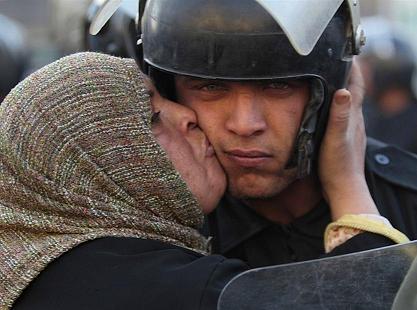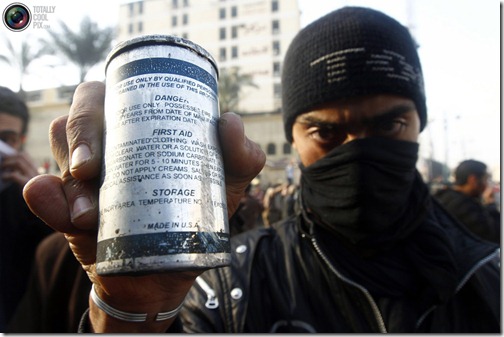
It’s been another eventful day in Egypt and more and more this feels like what watching the revolutions taking place in Eastern Europe in 1989 felt like — but hopefully Egypt won’t be another China. The best place to watch it all go down is still Al Jazeera,as the official Wikileaks twitter also acknowledges: Yes, we may have helped Tunisia, Egypt. But let us not forget the elephant in the room: Al Jazeera + sat dishes.
For us watching from the outside in it’s hard to understand what is going on now in Egypt, but one thing is clear: this is a spontaneous uprising, fueled by the despair and anger of the average Egyptian, not something organised by either the Muslim Brotherhood or other Islamist organisations, or by what’s left of the secular leftwing opposition to Mubarak. This doesn’t stop the western defence analysis community from invoking the old Islamist terror bugbears of course. And as discussed at Blood and Treasure, Mubarak’s new vicepresident and prime minister are both hardliners not adverse to using violence to solve their problems. Which may mean that either Mubarak is preparing to unleashthe army (if it let’s itself be unleashed at this point) or that the security services are mounting their own coup first against Mubarak, then against the protestors. But can they stop this spirit?
(Ignore the horrid music)
Aussie net magazine Crikey reports on one of the more interesting cyberspace aspects of the Tunesian and Egyptian revolutions, the involvement of the 4chan hackers’s movement Anonymous in helping the protestors communicate with the rest of the world as well as attacking government communication channels. However:
It is also profoundly at odds in its ethos and methods with traditional NGOs and activist groups. This is not your traditional protest movement and elements of it would be deeply hostile to more traditional political activism. Anonymous is something that, because it grew organically in cyberspace rather than reflecting the cyber version of existing real world phenomena, looks and works differently to real-world organisations or movements we’re familiar with. Something important and new is happening here.
See also Barret Brown: Anonymous: a net gain for liberty.

In the end, Anonymous has so far done more than the US government to encourage the movement for democracy in Egypt, since, as Simon Tisdall said in The Guardian on Friday:
That’s because, in the final analysis, the US needs a friendly government in Cairo more than it needs a democratic one. Whether the issue is Israel-Palestine, Hamas and Gaza, Lebanon, Iran, security for Gulf oil supplies, Sudan, or the spread of Islamist fundamentalist ideas, Washington wants Egypt, the Arab world’s most populous and influential country, in its corner. That’s the political and geostrategic bottom line. In this sense, Egypt’s demonstrators are not just fighting the regime. They are fighting Washington, too.
Much nearer to the truth than the insultingly bad propaganda coming from some circles that these protests have been supported by the US, as supposedly proven by certain leaked embassy files.